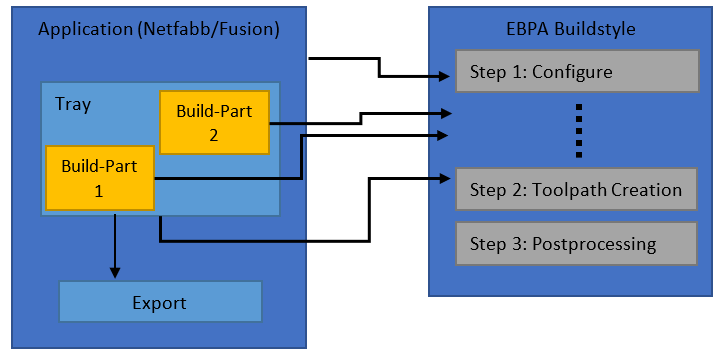
The postprocessing step takes place after toolpaths have been calculated for all parts on the tray. The toolpath creation step is done for each part individually and happens multi-threaded layer by layer. Therefore, it is not possible to achieve certain tasks in this step, e.g. sorting the toolpaths on a layer from left to right. It would only be possible to sort the toolpaths of one part from left to right.
In postprocessing the whole tray is available with all calculated toolpaths. This makes it possible to optimize the toolpaths on each layer, e.g. to reduce traveling time in between parts or to assign toolpaths to individual lasers.
As part of the configuration step there is a script function configurePostProcessingSteps which is used to configure the postprocessing step. Here is an example for the implementation of the configurePostProcessingSteps function:
/**
* @param a_config bsPostProcessingConfig
*/
exports.configurePostProcessingSteps = function(a_config)
{
// 1. Sorting the toolpaths and calculate build time for each layer
a_config.addPostProcessingStep(
postprocessLayerStack_MT,{bMultithread: true, nProgressWeight: 10});
// 2. Collecting the resulting build times from all layers
// and store the total time on the tray.
a_config.addPostProcessingStep(
postprocessLayerStack_ST,{bMultithread: false, nProgressWeight: 1});
}
The script function is registering other script functions to be called by the application to perform the postprocessing. Any number of functions can be registered, which will be called in the given order. The functions can be multi-threaded for time consuming tasks as well as single-threaded for tasks which require to analyze the data on the tray with a single thread. A progress weight is controlling the progress bar behavior of the main application while doing the postprocessing.
The functions named here must exist in the same script module. In this example, the first one (postprocessLayerStack_MT) will be called multiple times by multiple threads, each time with another range of layers. The second one (postprocessLayerStack_ST) will only be called once for the whole range of layers on the tray.
/**
* Multithreaded post-processing. This function may be called
* several times with a different layer range.
* @param a_modelData bsModelData
* @param a_progress bsProgress
* @param a_layer_start_nr Integer. First layer to process
* @param a_layer_end_nr Integer. Last layer to process
*/
var postprocessLayerStack_MT = function(
a_modelData,
a_progress,
a_layer_start_nr,
a_layer_end_nr)
{
a_progress.initSteps(a_layer_end_nr - a_layer_start_nr + 1);
for(let layer_nr = a_layer_start_nr; layer_nr <= a_layer_end_nr; ++layer_nr)
{
var exposure_array = a_modelData.getLayerPolylineArray(
layer_nr, POLY_IT.nLayerExposure, "rw");
// Doing something with the toolpaths of each layer,
// but only within the given range of layers because the function
// will be called again by another thread with another range of layers
a_progress.step(1);
}
};
/**
* Single threaded post-processing. This function will be called only once
* with the full layer range
* @param a_modelData bsModelData
* @param a_progress bsProgress
* @param a_layer_start_nr Integer. First layer to process
* @param a_layer_end_nr Integer. Last layer to process
*/
var postprocessLayerStack_ST = function(
a_modelData,
a_progress,
a_layer_start_nr,
a_layer_end_nr)
{
a_progress.initSteps(a_layer_end_nr - a_layer_start_nr + 1);
var layer_iter = a_modelData.getPreferredLayerProcessingOrderIterator(
a_layer_start_nr, a_layer_end_nr, POLY_IT.nLayerExposure);
while(layer_iter.isValid() && !a_progress.cancelled())
{
var layer_nr = layer_iter.getLayerNr();
var exposure_array = a_modelData.getLayerPolylineArray(
layer_nr, POLY_IT.nLayerExposure, "rw");
// Doing something with the toolpaths of each layer
layer_iter.next();
a_progress.step(1);
}
}
For backward compatibility it is possible to not provide the function configurePostProcessingSteps.
In that case it is possible to have no postprocessing at all or to have just one single threaded function which must be exported:
/**
* Postprocessing step. This function gets a whole tray of build parts
* @param modelData bsModelData
* @param progress bsProgress
* @param layer_start_nr Integer. First layer to process
* @param layer_end_nr Integer. Last layer to process
*/
exports.postprocessLayerStack = function(
modelData,
progress,
layer_start_nr,
layer_end_nr)
{
}
